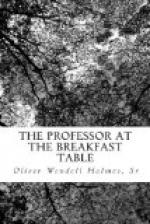I told you the young girl’s soul was in this book. As I turned over the last leaves I could not help starting. There were all sorts of faces among the arabesques which laughed and scowled in the borders that ran round the pages. They had mostly the outline of childish or womanly or manly beauty, without very distinct individuality. But at last it seemed to me that some of them were taking on a look not wholly unfamiliar to me; there were features that did not seem new.—Can it be so? Was there ever such innocence in a creature so full of life? She tells her heart’s secrets as a three-years-old child betrays itself without need of being questioned! This was no common miss, such as are turned out in scores from the young-lady-factories, with parchments warranting them accomplished and virtuous,—in case anybody should question the fact. I began to understand her;—and what is so charming as to read the secret of a real femme incomprise?—for such there are, though they are not the ones who think themselves uncomprehended women.
Poets are never young, in one sense. Their delicate ear hears the far-off whispers of eternity, which coarser souls must travel towards for scores of years before their dull sense is touched by them. A moment’s insight is sometimes worth a life’s experience. I have frequently seen children, long exercised by pain and exhaustion, whose features had a strange look of advanced age. Too often one meets such in our charitable institutions. Their faces are saddened and wrinkled, as if their few summers were threescore years and ten.
And so, many youthful poets have written as if their hearts were old before their time; their pensive morning twilight has been as cool and saddening as that of evening in more common lives. The profound melancholy of those lines of Shelley,
“I could lie down
like a tired child
And weep away
the life of care
Which I have borne
and yet must bear.”
came from a heart, as he says, “too soon grown old,”—at twenty-six years, as dull people count time, even when they talk of poets.
I know enough to be prepared for an exceptional nature,—only this gift of the hand in rendering every thought in form and color, as well as in words, gives a richness to this young girl’s alphabet of feeling and imagery that takes me by surprise. And then besides, and most of all, I am puzzled at her sudden and seemingly easy confidence in me. Perhaps I owe it to my—Well, no matter! How one must love the editor who first calls him the venerable So-and-So!




